- Home
- Fredric Brown
Night of the Jabberwock Page 13
Night of the Jabberwock Read online
Page 13
It was preordained; it had to be. That much of the pattern I saw. The name Yehudi hadn’t been an accident. I think that almost, just then, I had a flash of insight that would have shown me most of the pattern, if not all of it. You know how it is sometimes when you’re drunk, but not too drunk, you think you’re trembling on the verge of understanding something important and cosmic that has eluded you all your life? And—just barely possibly—you really are. I think I was, at that moment.
Then I looked up from the card and the thread of my thought was lost because Kates was staring at me. He’d turned just his head this time instead of the squeaking swivel chair he was sitting on. He was looking at me speculatively, suspiciously.
I tried to ignore it; I was trying to recapture my thoughts and let them lead me. I was close to something. I saw a man upon the stair. Yehudi Smith’s plump posterior ascending the attic stairs, just ahead of me.
No, the dead body with the contorted face—the poor piece of cold clay that had been a nice little guy with laughter lines around his eyes and the corners of his mouth—wouldn’t be there in the attic when Hank Ganzer looked for it. It couldn’t be there; its presence there wouldn’t fit the pattern that I still couldn’t see or understand.
Squeal of the swivel chair as Rance Kates turned his body to match the position of his head. “Is that the card that guy gave you?”
I nodded.
“What’s his full name?”
The hell with Kates. “Yehudi,” I said. “Yehudi Smith.”
Of course it wasn’t really; I knew at least that much now. I got up and walked to Kates’ desk. Unfortunately for my dignity, I weaved a little. But I made it without falling. I put the card down in front of him and went back and sat down again, managing to walk straight this time.
He looked at the card and then at me and then at the card and then at me.
And then I knew I must be crazy.
“Doc,’ he asked—and his voice was quieter than I’d ever heard it before – “what’s your bug number?”
CHAPTER ELEVEN
“O Oysters,” said the Carpenter,
“You’ve had a pleasant run!
Shall we be trotting home again?”
But answer came there none——
I JUST stared at him. Either he was crazy or I was——and several times in the last hour I’d been wondering about myself. What’s your bug number? What a question to ask a man in the spot I was in. What’s yours?
Finally I managed to answer. “Huh?” I said.
“Your bug number. Your label number.”
I got it then. I wasn’t crazy after all. I knew what he meant.
I run a union shop, which means that I’ve signed a contract with the International Typographical Union and pay Pete, my only employee, union wages. In a town as small as Carmel City, you can get by with a non-union shop, but I happen to believe in unions and to think the Typographical Union is a good one. Being a union shop, we put the union label on everything we print. It’s a little oval-shaped dingus, so small you can barely read the type if you’ve got good eyesight. And alongside it is an equally tiny number which is the number of my particular shop among the other union shops in my area. By the combination of the place name which is part of the label itself and the number of the shop beside it, you can tell where any given piece of union printing has been done.
But that little oval logotype is known to non-union printers as “the bug”. It does, I’ll admit, look rather like a tiny bug crawling across the bottom corner of whatever it’s put on. And non-union printers call the shop number alongside the “bug” the “bug number.” Kates wasn’t a printer, union or otherwise, but I remember now that two of his brothers, both living in Neilsville, were non-union printers, and naturally he’d have picked up the language—and the implied prejudice back of it—from them.
I said, “My label number is seven.”
He slapped the calling card down on the desk in front of him. He snorted—quite literally; you often read about people snorting but seldom hear them do it. He said, “Stoeger, you printed this damn thing yourself. The whole thing is a gag. Damn you——”
He started to get up and then sat down again and looked at the papers in front of him. He looked back at me and I think he was going to tell me to get the hell out, and then apparently he decided he might as well wait till Hank got back.
He shuffled papers.
I sat there and tried to absorb the fact that—apparently, at any rate—that Yehudi Smith calling card had been printed in my own shop. I didn’t get up to look at it. Somehow, I was perfectly willing to take Kates’ word for it.
Why not? It was part of the pattern. I should have guessed it myself. Not from the typeface; almost every shop has eight-point Garamond. But from the fact that the “DRINK ME” bottle had contained poison and Yehudi wasn’t going to be there when Hank looked for him. It followed the pattern, and I knew now what the pattern was. It was the pattern of madness.
Mine—or whose? I was getting scared. I’d been scared several times already that night, but this was a different variety of scared-ness. I was getting scared of the night itself, of the pattern of the night.
I needed a drink, and I needed it bad. I stood up and started for the door. The swivel chair screamed and Kates said, “Where the hell you think you’re going?”
“Down to my car. Going to get something. I’ll be back.” I didn’t want to get into an argument with him.
“Sit down. You’re not going out of here.”
I did want to get into an argument with him. “Am I under arrest? And on what charge?”
“Material witness in a murder case, Stoeger. If there’s a corpse where you say there’s one. If there isn’t, we can switch it to drunk and disorderly. Take your choice.
I took my choice. I sat down again.
He had me over a barrel and I could see that he loved it. I wished that I’d gone to my office and phoned the state police, regardless of repercussions.
I waited. That “bug number” angle of Kates’ had thrown me off thinking about how it could be and why it would be that Yehudi Smith’s calling card had been printed in my own print shop. Not that, come to think of it, the “how” had been difficult. I lock the door when I leave, but I lock it with a dime-store skeleton key. They come two on a card for a dime. Yes, Anybody could have got in. And Anybody whoever he was could have printed that card without knowing a damn thing about printing. You have to know the printer’s case to set type in quantity, but anybody could pick out a dozen letters, more or less, to spell out Yehudi Smith simply by trial and error. The little hand press I print cards on is so simple that a child—well, anyway, a high school kid—could figure out how to operate it. True, he’d get lousy impressions and waste a lot of cards trying to get one good one. But Anybody, if he’d tried long enough, could have printed one good card that said Yehudi Smith and carried my union label in the bottom corner.
But why would Anybody have done something like that?
The more I thought about it the less sense it made, although one thing did emerge that made even less sense that the rest of it. It would have been easier to print that card without the union label than with it, so Anybody had gone to a little additional trouble to bring out the fact that the card had been printed at the Clarion. Except for the death of Yehudi Smith the whole thing might have been the pattern of a monstrous practical joke. But practical jokes don’t include sudden death. Not even such a fantastic death as Yehudi Smith had met.
Why had Yehudi Smith died?
Somewhere there had to be a key.
And that reminded me of the key in my pocket and I took it out and stared at it, wondering what I could open with it. Somewhere there was a lock that it fitted.
It didn’t look either familiar or unfamiliar. Yale keys don’t. Could it be mine? I thought about all the keys I owned. The key to the front door of my house was a Yale type key, but not actually a Yale. Besides——
I took t
he keytainer from my pocket and opened it. My front door key is on the left and I compared it with the key I’d brought away from the attic. The notches didn’t match; it wasn’t a duplicate of that one. And it was still more different from my back door key, the one on the other side of the row. In between were two other keys but both were quite different types. One was the key to the door at the Clarion office and the other was for the garage behind my house. I never use the garage key; I keep nothing of value in the garage except the car itself and I always leave it locked.
It seemed to me that I’d had five keys instead of four, there on the keytainer, but I couldn’t remember for sure and I couldn’t figure out what the missing one was, if one really was missing.
Not the key to my car; I didn’t keep that on the keytainer (I hate a keytainer dangling and swinging from my ignition lock, so I carry the car key loose in my vest pocket).
I put the keytainer back in my pocket and stared at the single key again. I wondered suddenly if it could be a duplicate of my car key. But I couldn’t compare it to see because, this time, I’d left the key in the lock when I’d got out of the car, thinking I was going to be up here in the sheriff’s office only a minute or two and that then he’d be heading out to the Wentworth place with me.
Kates must have turned his head—not his swivel chair, for it didn’t squeak—and seen me staring at the key. He asked, “What’s that?”
“A key,” I said. “A key to unlock a riddle. A key to murder.”
The chair did squeak then. “Stoeger, what the hell? Are you just drunk, or are you crazy?”
“I don’t know,” I said. “Which do you think?”
He snorted. “Let’s see that key.” I handed it to him.
“What’s it open?”
“I don’t know.” I was getting mad again—not particularly at Kates this time; at everything. “I know what it’s supposed to open.”
“What?”
“A little door fifteen inches high off a room at the bottom of a rabbit hole. It leads to a beautiful garden.”
He looked at me a long time. I looked back. I didn’t give a damn.
I heard a car outside. That would be Hank Ganzer, probably. He wouldn’t have found the body of Yehudi Smith in the attic out on the pike. I knew that, somehow.
And how Kates was going to react to that, I could guess. Even though, obviously, he didn’t believe a damn word of it to begin with. I’d have given a lot, just then, to see inside Rance Kates’ mind, or what he uses for one, to see just what he was thinking. I’d have given a lot more, though, to be inside the mind of Anybody, the person who’d printed Yehudi Smith’s card on my hand press and who’d put the poison in the “DRINK ME” bottle.
Hank’s steps coming up the stairs.
He came in the door and his eyes happened to be looking in my direction first. He said, “Hi, Doc,” casually and then turned to Kates. “No sign of an accident, Rance. I drove slow, watched both sides of the road. No sign of a car going off. But look, maybe we should both do it. If one of us could keep moving the spotlight back and forth while the other drove, we could see back farther.” He looked at his wrist watch. “It’s only two-thirty. Won’t get light until six, and in that long a time——”
Kates nodded. “Okay, Hank. But listen, I’m going to get the state boys in on this case—well, in case Bonney’s car turns up somewhere else. We know when they left Neilsville, but we can’t be positive they started for Carmel City.”
“Why wouldn’t they?”
“How would I know?” Kates said. “But if they did start here, they didn’t get here.”
I might as well not have been there at all.
I cut in. “Hank, did you go to the Wentworth place?”
He looked at me. “Sure, Doc. Listen, what kind of a gag was that?”
“Did you look in the attic?”
“Sure. Looked all around it with my flashlight.”
I’d known it, but I closed my eyes.
Kates surprised me, after all. His voice was almost gentle. “Stoeger, get the hell out of here. Go home and sleep it off.”
I opened my eyes again and looked at Hank. “All right,” I said, “I’m drunk or crazy. But listen, Hank, was there a candle stub standing on top of the post at the top of the attic steps?”
He shook his head slowly.
“A glass-topped table, standing in one corner—it’d be the north-west corner of the attic?”
“I didn’t see it, Doc. I wasn’t looking for tables. But I’d have noticed a candle stub, if it had been on the stair post. I remember putting my hand on it when I started down.”
“And you don’t recall seeing a dead body on the floor?”
Hank didn’t even answer me. He looked back at Kates. “Rance, maybe I’d better drive Doc home while you’re making those calls. Where’s your car, Doc?”
“Across the street.”
“Okay, we won’t give you a parking ticket. I’ll drive you home in mine.” He looked at Kates for corroboration.
Kates gave it. I hated Kates for it. He was grinning at me. He had me in such a nasty spot that, damn him, he could afford to be generous. If he threw me in the can overnight, I could fight back. If he sent me home to sleep it off—and even gave me a chauffeur to take me there——
Hank Ganzer said, “Come on, Doc.” He was going through the door.
I got to my feet. I didn’t want to go home. If I went home now, the murderer of Yehudi Smith would have the rest of the night to finish—to finish what? And what was it to me, except that I’d liked Yehudi Smith? And who the hell was Yehudi Smith?
I said, “Listen, Kates——”
Kates looked past me at the doorway. He said, “Go on, Hank. See if his car is parked straight and then I’ll send him down. I think he can make it.”
He probably hoped I’d break my neck going down the steps.
“Sure, Rance.” Hank’s footsteps going down the stairs. Diminuendo.
Kates looked up at me. I was standing in front of his desk, trying not to look like a boy caught cheating in an examination standing in front of his teacher’s desk.
I caught his eyes, and almost took a step backward. I hated Kates and knew that he hated me, but I hated him as one hates a man in office whom one knows to be a stupid oaf and a crook. He hated me, I thought, as someone who, as an editor, had power—and used it—against men like him.
But the look in his eyes wasn’t that. It was sheer personal hatred and malevolence. It was something I hadn’t suspected, and it shocked me. I don’t, after fifty-three years, shock easily.
And then that look was gone, as suddenly as when you turn out a light. He was looking at me impersonally. His voice was impersonal, almost flat, not nearly as loud as usual. He said, “Stoeger, you know what I could do to you on something like this, don’t you?”
I didn’t answer; he didn’t expect me to. Yes, I knew some of the things. The can overnight on a drunk and disorderly charge was a starting point. And if, in the morning, I persisted in my illusions, he could call in Dr. Buchan for a psychiatric once-over.
He said, “I’m not doing it. But I want you out of my hair from now on. Understand?”
I didn’t answer that, either. If he wanted to think silence was consent, all right. Apparently he did. He said, “Now get the hell out of here.”
I got the hell out of there. I’d got off easy. Except for that look he’d given me.
No, I didn’t feel like a conquering hero about it. I should have faced up to it, and I should have insisted that there had been a murder in that attic, whether there was a corpus delicti there now or not. But I was too mixed up myself. I wanted time to think things out, to figure what the hell had really happened.
I went down the stairs and out into the night again.
Hank Ganzer’s car was parked right in front, but he was just getting out of my car, across the street. I walked over toward him.
He said, “You were a little far out from the kerb, Doc. I
moved it in for you. Here’s your key.”
He handed me the key and I stuck it in my pocket and then reopened the door he’d just closed to get the bottle of whisky that was lying on the seat. No use leaving that, even if I had to leave the car here.
I stepped back, then, to the back of the car to take another look at those back tyres. I still couldn’t believe them; this morning they’d been completely flat. That was part of the puzzle, too.
Hank came back and stood by me. “What’s the matter, Doc?” he asked. “If you’re looking at your tyres, they’re okay.” He kicked the one nearest him and then walked around and kicked the other. He started back, and stopped.
He said, “Say, Doc, something you got in your luggage compartment must’ve spilled over. Did you have a can of paint or something in there?”
I shook my head and came around to see what he was looking at. It did look as though something had run out from under the bottom edge of the luggage compartment door. Something thick and blackish.
Hank turned the handle and tried to lift.
“It’s not locked,” I said. “I never bother to lock it. Nothing in there but a worn-out tyre without a tube in it.”
He tried again. “The hell it’s not locked. Where’s the key?”
Another piece of the pattern fell into place. I knew now what the fifth key, the middle one, on my keytainer should have been. I never lock the luggage compartment of my car except on the rare occasions when I take a trip and really have luggage in it. But I carry the key on my keytainer. And it was a Yale key and it hadn’t been there when I’d looked a few minutes ago.
I said, “Kates has got it.” It had to be. One Yale key looks like another, but the card, Yehudi Smith’s card, had been printed in my own shop. The key would be mine, too.
Hank said, “Huh?”
I said again, “Kates has got it.”
Hank looked at me strangely. He said. “Wait just a minute, Doc,” and walked across to his own car. Twice, on the way, he looked back as though to be sure I wasn’t going to get in and drive away.

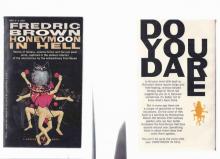 Hall of Mirrors
Hall of Mirrors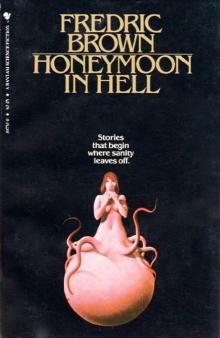 Honeymoon in Hell
Honeymoon in Hell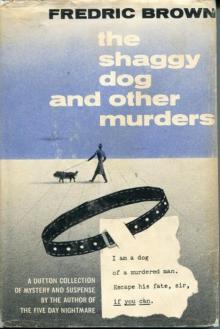 The Shaggy Dog and Other Murders
The Shaggy Dog and Other Murders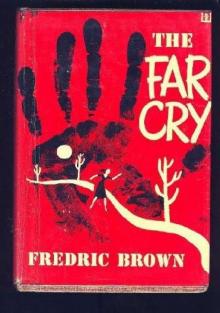 The Far Cry
The Far Cry Arena
Arena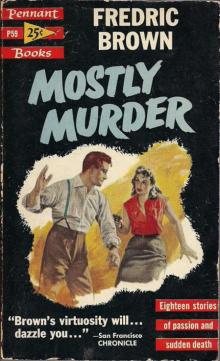 Mostly Murder
Mostly Murder The Geezenstacks
The Geezenstacks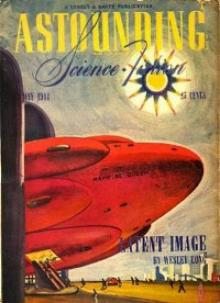 The Yehudi Principle
The Yehudi Principle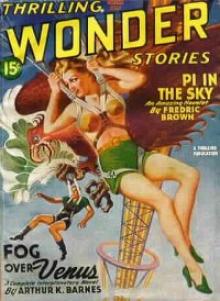 Pi in the Sky
Pi in the Sky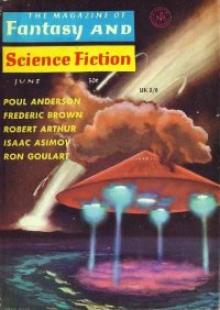 Eine Kleine Nachtmusik
Eine Kleine Nachtmusik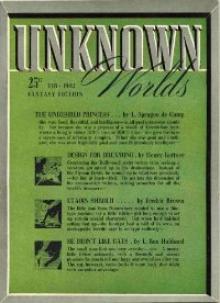 Etaoin Shrdlu
Etaoin Shrdlu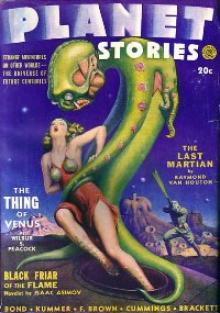 The Star Mouse
The Star Mouse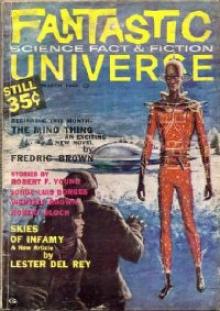 The Mind Thing
The Mind Thing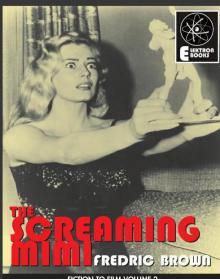 The Screaming Mimi
The Screaming Mimi The Fabulous Clipjoint
The Fabulous Clipjoint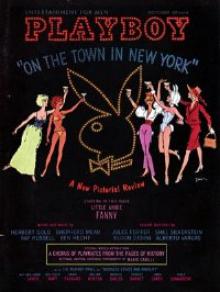 Puppet Show
Puppet Show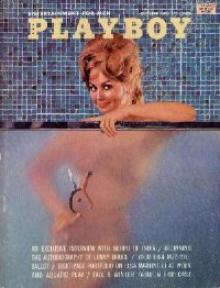 It Didn't Happen
It Didn't Happen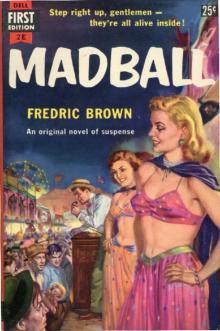 Madball
Madball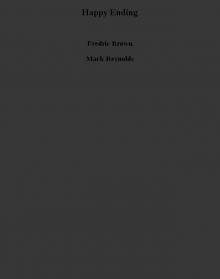 Happy Ending
Happy Ending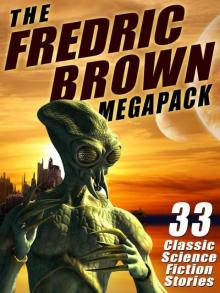 The Fredric Brown Megapack: 33 Classic Science Fiction Stories
The Fredric Brown Megapack: 33 Classic Science Fiction Stories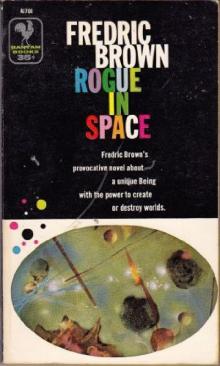 Rogue in Space
Rogue in Space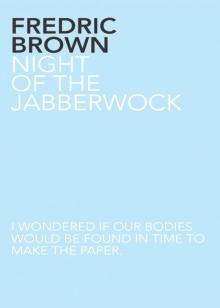 Night of the Jabberwock
Night of the Jabberwock The Dead Ringer
The Dead Ringer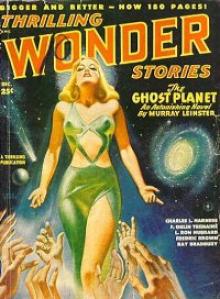 Knock
Knock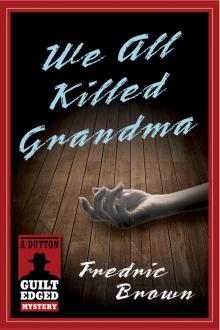 We All Killed Grandma
We All Killed Grandma Space On My Hands
Space On My Hands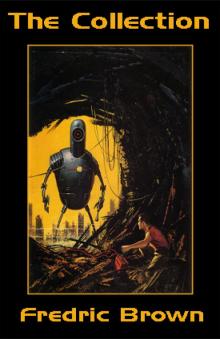 The Collection
The Collection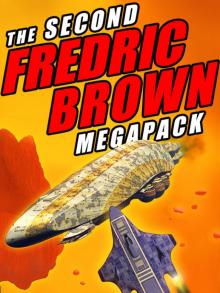 The Second Fredric Brown Megapack: 27 Classic Science Fiction Stories
The Second Fredric Brown Megapack: 27 Classic Science Fiction Stories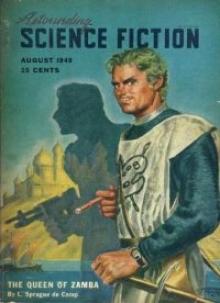 Letter to a Phoenix
Letter to a Phoenix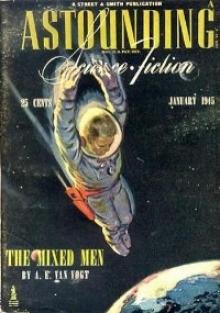 The Waveries
The Waveries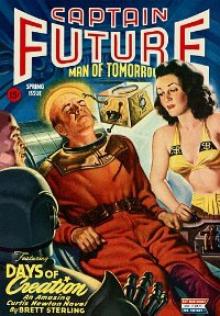 Nothing Sirius
Nothing Sirius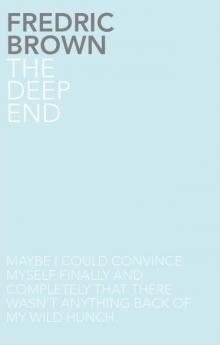 The Deep End
The Deep End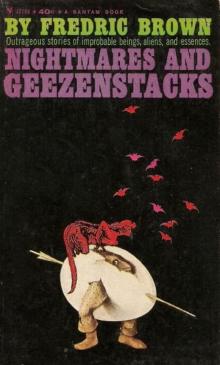 Nightmares & Geezenstacks
Nightmares & Geezenstacks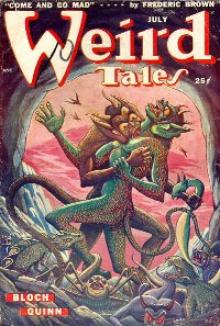 Come and Go Mad
Come and Go Mad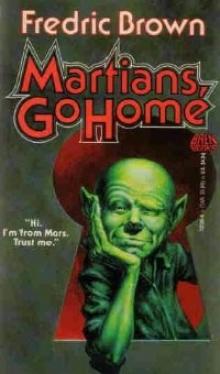 Martians, Go Home
Martians, Go Home